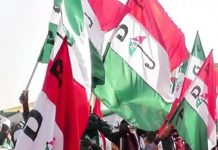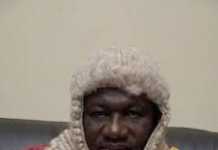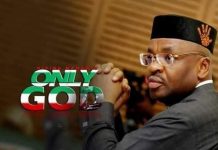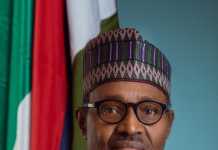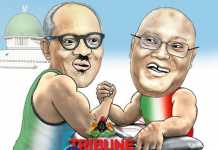THE Presidential Election Petition Panel, sitting at the Court of Appeal in Abuja, will today begin its inaugural session on the four petitions filed before the Presidential Election Petition Tribunal (PEPT), challenging the election victory of President Muhammadu Buhari in the February 23, 2019, Presidential election.
Already, notice had been served on all the parties to the petitions, including the Independent National Electoral Commission (INEC) and others that were said to have been served through their lawyers included the All Progressives Congress (APC), President Buhari, the Peoples Democratic Party (PDP) and it’s Presidential candidate, Alhaji Atiku Abubakar.
Atiku and his party, the PDP, Hope Democratic Party and its presidential candidate, Ambrose Albert Ogboru, Coalition for Change (C4C) and its presidential candidate, Geff Chizee Ojinika and Pastor Aminchi Habu and his party, Peoples Democratic Movement (PDM) had petitioned the Tribunal challenging the declaration of President Buhari by INEC as the winner of the 2019 presidential election.
READ ALSO: LIVE PHOTOS: All set as 2019 Presidential Election Petitions Tribunal begins hearing
The session inaugural session will basically afford the tribunal the opportunity to meet the parties with a view to setting up modalities to be adopted in the actual hearing of substantive issues in the matter in the various petition.
Apart from the petition marked CA/PEPC/002/2019, which was entered against Buhari by Atiku and his party, on March 18, the second petition marked CA/ PEPC/001/2019, was by Owuru and his party, while the third petition, CA/PEPC/004/2019, was lodged by the presidential candidate of the PDM, Pastor Aminchi Habu, who is seeking a fresh election on the basis that his party’s logo was not included in the ballot paper.
The last petition, numbered, CA/PEPC/003/2019, was filed by the C4C and its presidential candidate, Ojinika, who are contending that Buhari’s re-election was marred by substantial non-compliance with mandatory statutory provisions of the Electoral Act.
The petitioners maintained that the irregularity substantially affected the election, such that Buhari was not entitled to be returned as the winner of the election.
Unlike in all the other petitions where only Buhari, the APC and the electoral body were cited as Respondents, the C4C cited Vice President Yemi Osinbajo, as the 2nd Respondent in its petition.
INEC had on February 27, declared that Buhari garnered a total of 15,191,847 votes to defeat his closest rival, Alhaji Atiku Abubakar of the PDP, who it said polled a total of 11,262,978 votes.
Atiku and his party had, in their petition, insisting that data they secured from INEC’s server, revealed that they clearly defeated President Buhari with over 1.6million votes.
The petitioners alleged that INEC had at various stages of the presidential election, unlawfully allocated votes to Buhari, saying they would adduce oral and documentary evidence to show that result of the election as announced by the electoral body, did not represent the lawful valid votes cast.
Atiku alleged that in some states, INEC deducted lawful votes that accrued to him, in its bid to ensure that Buhari was returned back to the office.
The petitioners said they would call evidence of statisticians, forensic examiners and finger-print experts at the hearing of the petition to establish that the scores credited to Buhari were not the product of actual votes validly cast at the polling units.
In one of the five grounds of the petition, Atiku and the PDP maintained that Buhari was not qualified to run for the office of the President as he does not possess the constitutional minimum qualification of a school certificate.
They argued that proper collation and summation of the presidential election results would show that contrary to what INEC declared, Atiku, garnered a total of 18,356,732 votes, ahead of Buhari who they said got a total of 16,741,430 votes.
They urged the Tribunal to hold that Buhari was not duly elected by a majority of lawful votes cast in the said election and therefore the declaration and his return as the President of Nigeria in that election was unlawful, undue, null, void and of no effect.
“That it may be determined that the 1st Petitioner (Atiku) was duly and validly elected and ought to be returned as President of Nigeria, having polled the highest number of lawful votes cast at the election to the office of the President of Nigeria held on 23rd February 2019 and having satisfied the constitutional requirements for the said election.
They prayed the tribunal for an order directing the INEC to issue Certificate of Return to Atiku as the duly elected President of Nigeria.
In the alternative, the petitioners prayed the tribunal to nullify the February 23 presidential election and order a fresh poll.
Reacting, both Buhari and the APC, filed preliminary objections to challenge the competence of the petitions, even as they challenged Atiku’s locus-standi to even participate in the Presidential poll on the grounds that he is not a Nigerian.
Buhari told the tribunal that contrary to Atiku’s allegation that he submitted false academic qualifications in the Form CF001 he used to secure clearance from INEC, he said he was at the time of the election, “eminently qualified to contest the election, having not only the minimum qualification of reading up to secondary school level but rose to the peak of his career as a General in the Nigerian Army with cognate experience and training.
Buhari said he has more educational qualification than Atiku.
APC told the tribunal that the PDP candidate is a Cameroonian.
The ruling party argued that contrary to Atiku’s claims in his petition, he had no right to be voted for as a candidate in the election to the office of President of the Federal Republic of Nigeria held on February 23, 2019.
APC contended that most of the claims contained in Atiku’s petition have become statute-barred, arguing that the Tribunal was therefore bereft of the jurisdiction to entertain it.
However, in a further response he filed before the tribunal, Atiku, rebuked the APC, describing the allegation that he is a Cameroonian as puerile, face-saving, vexatious, absolutely and completely unfounded.
Atiku maintained that he is a full blooded Nigerian, even as he urged the tribunal to ignore what he termed as “extraneous facts, contradictory, diversionary, evasive, speculative and vague assertions,” by both the APC and President Buhari.
Atiku told the tribunal that contrary to APC’s allegation that he is an alien, he said he is a Nigerian by birth and a Fulani by tribe, adding that his parents were from Jigawa and Sokoto states.
Kindly contact us @ Naijalivetv@gmail.com
Call or Whatsapp: 07035262029, 07016666694, 08129340000



